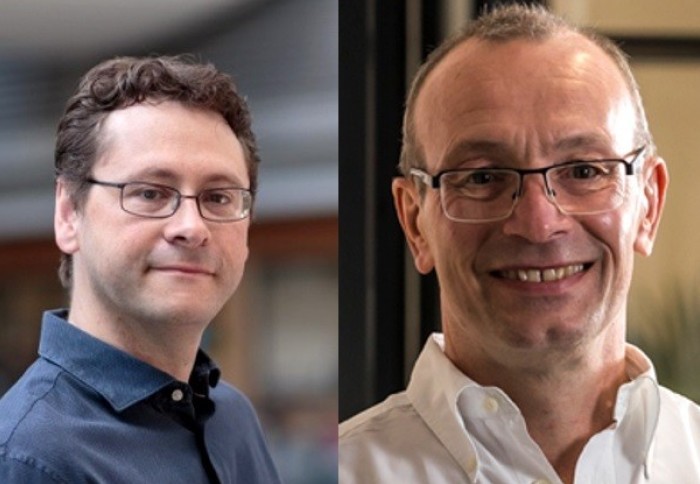Imperial startup wins £4.5m investment to develop new cancer drugs

Myricx was founded by Ed Tate (L) and Roberto Solari (R)
An Imperial startup has won £4.5m investment to develop drugs that could offer a safer and more effective way to treat certain drug-resistant cancers.
The startup, called Myricx, was founded by researchers from Imperial College London and the Francis Crick Institute. It is aiming to develop the first cancer drugs designed to destroy cancer cells by inhibiting the function of N-myristoyltransferase (NMT) – an enzyme that modifies proteins, a vital prerequisite for several of the processes cells use to stay alive.
The funding will enable us to advance our breakthrough discoveries in cancer and brings us a step closer to fulfilling our vision of unlocking the potential of N-myristoyltransferase (NMT) Professor Ed Tate
Following many years of research, the team created highly selective and potent drug-like inhibitors of NMT. The team had early research successes in testing these inhibitors as anti-viral agents, showing that inhibiting NMT could block the common cold and polio viruses.
They went on to test these inhibitors against a wide range of cancer cell types and discovered that certain types of cancer are highly sensitive to inhibition of NMT through a novel and unexpected mechanism. This triggered the formation of Myricx, which will create a pipeline of drug molecules to fight treatment-resistant cancers.
Advancing breakthrough discoveries
Myricx Pharma was founded by Chief Scientific Officer (CSO) Professor Ed Tate, from the Department of Chemistry at Imperial and the Francis Crick Institute, and Chief Executive Officer (CEO) Dr Roberto Solari, from the National Heart & Lung Institute at Imperial. They are joined by Dr Andrew Bell, also from the Department of Chemistry at Imperial, as a Chemistry Consultant.
Professor Tate, who runs labs both at Imperial’s new Molecular Sciences Research Hub on its White City campus and at the Francis Crick Institute, said: “The funding will enable us to advance our breakthrough discoveries in cancer and brings us a step closer to fulfilling our vision of unlocking the potential of N-myristoyltransferase (NMT) as a therapeutic target and developing precision medicines for a range of diseases with unmet medical need.”
The company has secured an initial £4.5 million seed financing from experienced venture investors, Sofinnova Partners, a leading European life sciences venture capital firm based in Paris, London and Milan, and Brandon Capital Partners, Australia’s leading life science venture investor for seed and early stage companies.
Dr Solari said: “Thanks to a supportive government environment the UK is an outstanding place for life science research and biotech commercialisation. Raising £4.5 million in seed funding as the global economy struggles with the coronavirus pandemic is a testament to our breakthrough discoveries and promising future. Brandon Capital and Sofinnova Partners expertise in growing early stage innovative companies will be of immense value to us and we look forward to benefiting from their support and experience.”
Tech transfer success
The academics behind Myricx won early funding from the College’s Confidence in Concept scheme and went on to receive guidance from tech transfer specialists in the College’s Enterprise team. Imperial’s tech transfer function was brought in-house in March 2019.
Professor Nick Jennings, Vice-Provost (Research and Enterprise) at Imperial, said: “With a thriving entrepreneurial ecosystem, Imperial is one of the world’s best and most innovative universities not only for the quality of our basic research but also our translation and commercialisation.
“The formation of Myricx represents the culmination of years of research drawing on funding from multiple UK and European funding sources, paired with multiple patents and specialist support from the College’s in-house experts in patenting and commercialisation.
“I warmly congratulate Professor Tate and Dr Solari on their research breakthroughs, and their achievement in attracting venture funding to enable them to make a real-world impact with their research.”
Article text (excluding photos or graphics) © Imperial College London.
Photos and graphics subject to third party copyright used with permission or © Imperial College London.
Reporter
Hayley Dunning
Communications Division
David Silverman
Communications Division